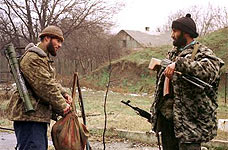|
Conflicts In The Caucasus Olga Vassilieva |
||
|
Introduction
|
Social mobilization during Gorbachev's perestroika turned into ethno-national movements under the slogans of the restoration (the creation) of national autonomy in "historical territory of a particular ethnic group” that, in turn, fueled inter-ethnic conflicts all over the Caucasus as several ethnic groups consider the same territory "an ethnic motherland." Five conflicts, including current Russian war in Chechenia, have turned into deadly violent conflicts. Many conflicts are frozen in the “no peace, no war” state. Conflict prevention remains the main priority and need for this region. Meanwhile, there is no third-part actor, who not only is deeply interested in conflict prevention, but also possesses necessary resources and political will. Russia, Turkey and Iran have no sufficient potential as well as political trust, considering historical relationships among peoples in the region. Criticizing Russia for its policy towards the Caucasus, the West has kept distance to be involved in the conflict mediation, or conflict transformation. NGOs are weak, and do not have significant influence in the region. The United Nations and OCSE peacekeeping and preventive actions would be the most desirable option for conflict management in the Caucasus. They could bring neutrality and impartiality so necessary and so deficient in the Caucasus. The UN and OCSE could provide diplomatic and political expertise to manage crises, special tools for bringing parties together in long but constructive dialogue. They might organize diplomatic and even economic pressure on the sides in conflict. However, the UN has been overloaded by responsibilities trying to mediate conflicts all over the globe; OCSE has mainly concerned the Balkan conflict zone. Understanding precisely, that conflict management in the Caucasus is impossible without all-side developments efforts, international organizations have limitated their activities by humanitarian actions. Which mechanism might be proposed additionally to create and strengthen a preventive regime in the Caucasus? In my opinion, the creation and development of regional – Caucasian – organization(s) might become such a mechanism in the future. This organization (or a network of organizations) might create a basis for the development of a security community in the region. During the last decade the Caucasus has demonstrated two tendencies – the growth of competitive ethno-national movements and the development of different cooperative organizations. It has reflected a multi-level choice of identities. Peoples of the Caucasus have ascribed themselves to a local community, to a tribe, to an ethnos, to a particular religious or political movement. But what unites all these peoples living now in different states is the common Caucasian identity based not on common language but shared regional myths, traditions and values. Ethnic identity has played a key role in the development of ethno-nationalisms, and as a consequence, in conflict escalation, considering scarce resources and mutual claims. Caucasian identity resulted in the development of cooperative movements, which contribute to conflict resolution, although their influence on conflict development were much weaker than the contribution of an ethnic identity to conflict escalation. This paper considers causes and main conflicts in the Caucasus, current situation and perspectives for conflict settlement.
|
